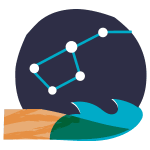Skip the negative aspects of light pollution and focus on the positive values of darkness. Let’s do it!
“Promoting darkness, not as a return to the Dark Ages, but as a move towards a new era in which ecological, social and economic aspects are considered and brought together.” With these words, the Minister für Energiewende, Landwirtschaft, Umwelt, Natur und Digitalisierung of Schleswig-Holstein, Jan Philipp Albrecht, expressed his welcome to almost 100 participants of the Erlebe die Finsternis Webinar, which was held the 23rd of April.
During the webinar there were key note speeches and different workshops where participants learned about the dark side of light; how our deeply rhythmic planet is affected by Artificial Light at Night (ALAN) and much more…
Preserve darkness in the Wadden Sea Region
During the webinar Cristina Nazzari from the Partnership Hub and Sonja van der Graaf from the Programme towards a Rich Wadden Sea explained their aspirations. In the Dark Sky Wadden Sea Initiative, different groups from the three Wadden Sea countries, amongst others related to the islands of Pellworm, Spiekeroog and Mandø, are working together to preserve darkness in the Wadden Sea area. Together they want to raise awareness for the importance of natural nocturnal darkness in the Wadden Sea Region and for the World Heritage. Moreover, they want to encourage taking physical measures in order to reduce light emissions. And, they aim at creating more possibilities to experience dark nights, as darkness is one of the unique selling points of this region. The goal is to develop together an action plan and look for funding.
Another aim is to get darkness on the political agenda. It will be helpful if darkness will be seen as a key quality of the Wadden Sea area which supports and enhances the Outstanding Universal Values of the World Heritage Wadden Sea and policies and monitoring will be adapted in this sense.
Key note speeches and workshops
Professor Barbara Helm from the University of Groningen explained that all living things have internal clocks tuned to light and that effects of ALAN scale up to ecosystem-level which means that conservation areas can only fully function if protected from ALAN. The good news is, that this can be achieved locally.
Tom Axelsen, an amateur astronomer who turned into a night activist from the Danish island of Møn, told how he managed to inspire his community to embrace darkness. A bottom-up approach, talking to hearts, engaging proudness, organizing events and giving information and information and information……… were the key elements of his approach. Now darkness has become an economic asset and tourism is flourishing but, the progress towards “more darkness” has come to a halt. His lesson learned is that we should not forget to develop strong policies.
Which is in line with the experiences of Harald Bardenhagen, an astronomist from the Sternenpark Nationalpark Eifel area. With attractive activities, also during day time, a good marketing and publication strategy, partnerships with tourist organizations and good customer relation systems he managed to receive, on average, 6000 guests at the observatory per year. His call remains that we should consider light pollution abatement and protection of natural nightscapes as one of our vital tasks.
Policies were also the subject of Sabine Frank, the night protection commissioner at the district of Fulda, the UNESCO Rhön Biosphere Reserve and IDA Star Park. She advised to focus on the future and prevent light pollution in advance by e.g. including technical guidelines in building permissions or developing clear policies in land use planning.
Andreas Hänel showed how governments and citizens can easily improve darkness. Jaap Kloosterhuis, from the Dark Sky Park Lauwersmeer, tries to boost the darkness experience so that people enjoy darkness instead of feeling afraid. In this way they sometimes even become ambassadors of darkness and implement the technical solutions to which Andreas referred to.
Good stories help to create awareness. Nynke Rixt Jukema referred to the fact that our cultural heritage already includes night time stories but often they are not that positive. Although they might be of use entertaining tourists when offering darkness events, we also need positive stories and maybe we have to create new stories.
Which is more or less in line with what Taylor Stone, expert of night time lighting at Delft University, expressed. In stead of looking at the negative aspects of light pollution it is better to focus on the positive values of darkness and take these to guide lighting policy, design and innovation.
John Frikke project Manager of the Nationalpark Vadehavet (The Wadden Sea National Park in Denmark) showed how darkness matters for the Wadden Sea World Heritage. Natural darkness not only belongs to the undisturbed natural processes, light pollution can have a detrimental effect, for example, on migrating birds and we all know the importance of this area in the East Atlantic Flyway.
Therefore the efforts of the Danish Mandø team in becoming an IDA recognized Dark Sky Park are very much appreciated. They improve darkness and are happy that their team consists of partners with different backgrounds (municipality, amateur astronomists, nature conservationists) and complementary knowledge and competences. They admit that the process took more time than expected but they are almost there.
Experience the darkness – Erlebe die Finsternis – At opleve mørket – Beleef de donkerte
All presentations of the webinar are available on the webpage Experience Dark Sky Wadden Sea Region.
As a support for those who want to engage activities related to darkness, the Dark Sky Wadden Sea Initiative prepared factsheets in Danish, German, Dutch and English which also can be found on the webpage Experience Dark Sky Wadden Sea Region.
Become partner of the Dark Sky Wadden Sea Initiative?
Then you can contact Cristina Nazzari (nazzari@waddensea-secretariat.org) from the Partnership Hub or Sonja van der Graaf (sonja.vandergraaf@rvo.nl) from the Programme towards a rich Wadden Sea (PRW)

